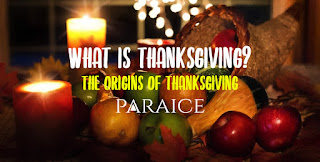Thanksgiving is an ancient tradition of celebrating agricultural harvests. The Old Testament already mentions Hebrew harvest festivals (Sukkot) to thank and "give thanks" to Yawhe, the Creator of the world.
This festival is also found in the Hellenic tradition, where it is dedicated to Ceres, the goddess of agriculture (she who gave wheat to mankind).
 |
| What is Thanksgiving? | The Origins Of Thanksgiving |
There is no doubt that in Canada, Thanksgiving, the official holiday and day off, is a holiday that has changed dates many times.
This festival was brought to Quebec (rather to Lower Canada) by Quebecers of British origin, who emigrated from the United States towards the end of the 18th century.
The Origins Of Thanksgiving
The first day of Thanksgiving was celebrated on January 10, 1799, "to mark the victory over our enemies and for the many and invaluable graces that our kingdoms and provinces have received and continue to receive every day" (the enemies were the French revolutionaries with their ideas of raising Quebec against the British Empire).
The second time, Thanksgiving was celebrated on Thursday, August 12, 1802 simply "for divine graces. After a long 12-year break, however, Thanksgiving was celebrated twice in 1814: on Thursday, April 21, 1814 "for the glorious victories over our enemies" - because of the war against the United States, and on Tuesday, September 13, 1814 "to mark the end of the bloody conflict in Europe and to secure for the King's estates the blessings of peace".
Six months passed, and we celebrated again: on Thursday, April 6, 1815, we celebrated "the end of the war with the United States and to bring back the benefits of peace".
In the first half of the 19th century, Thanksgiving was still celebrated not on a fixed date but to mark happy events:
- May 1816: the end of the war between Great Britain and France;
- in February 1833: the end of the cholera epidemic;
- November 1, 1834: the end of the quarantine imposed on ships at Grosse-Île on the Magdalen Islands;
- February 1838: Lower Canada celebrates the end of the Patriots' Rebellion;
- in June 1856: the restoration of peace with Russia after the Crimean War.
- Thanksgiving was finally celebrated on the second Monday in October, but it was in 1957 that Thanksgiving Day was permanently set for the second Monday in October.
- It should be noted that although Thanksgiving in Canada was borrowed from the Americans (as was the menu, which consisted primarily of turkey), Canadian Thanksgiving should not be confused with American Thanksgiving or Thanksgiving, which is celebrated in the United States a month later than in Canada for geographical reasons (the harvest takes place a month later in the United States).


